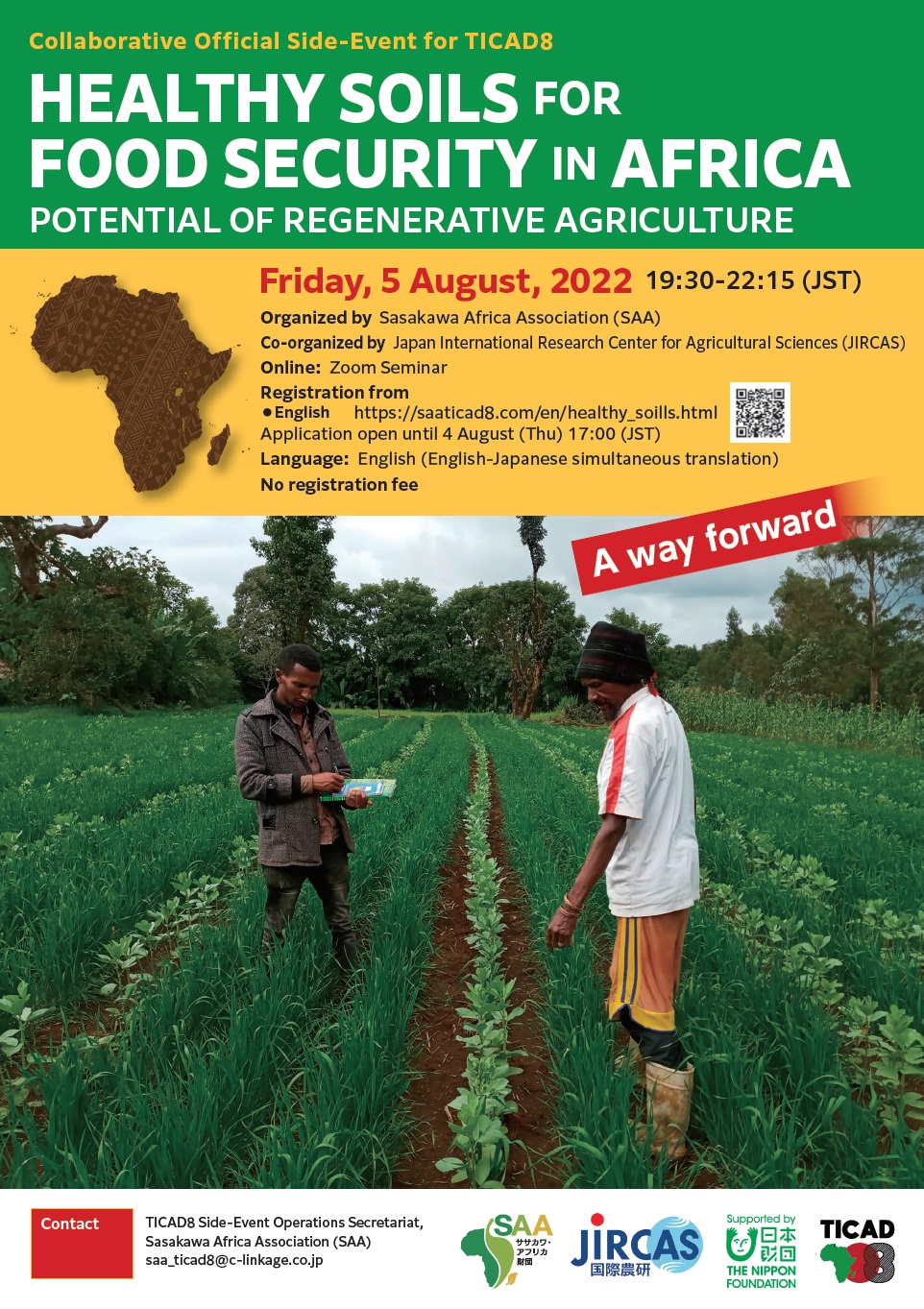Official Side-Event for TICAD8
“HEALTHY SOILS FOR FOOD SECURITY IN AFRICA” -POTENTIAL OF REGENERATIVE AGRICULTURE-
Overview
Agriculture in Africa has been severely impacted by soil and ecosystems degradation, driven by chronically low soil fertility compounded by soil nutrient mining, resulting in low productivity and food insecurity. African agricultural development requires ‘a healthy soil producing a healthy crop’. At the same time, with growing imperatives to address climate change, African agriculture is no exception to pursue soil fertility management solutions contributing to regenerative development pathways.
Regenerative Agriculture (RA) is an approach which is currently attracting global attention with its focus to restore soil health and reduce soil degradation. RA proposes the implementation of practices that increase organic matters into the soil to promote microbial activity, by reducing mechanical soil disturbance, using cover crops and encouraging farm biodiversity.It assumes that If the biological, physical, and chemical improvement of the soil is promoted through this process, and good crop growth environment is ensured, the use of chemical fertilizers and argo-chemicals, whose prices have been recently increasing, could be reduced thus helping to ensure increased biodiversity and soil environmental health. It is further expected that improved cultivation methods such as reduced tillage and mulching will maintain soil organic matter, especially when combined with afforestation and other practices that contribute to carbon sequestration, reduced carbon emissions, and thus climate change mitigation. In turn, in African smallholder contexts, especially where soil is inherently infertile and soil nutrient mining is perversive, Sustainable Agricultural Intensification (SAI) has been long advocated and promoted. SAI priotizes improving productivity through integrated soil fertility management which may necessiate the judicious use of organic as well as inorganic fertilizers along with some tilling practices depending on local edapho-climatic and socioeconomic conditions.
Realizing the vision of RA in African smallholder contexts requires its compatibitility with SAI practices at farmers’ farm scale to achieve both improved soil health and food security. The key is how to reach the consensus on ‘truly regenerative management of a healthy soil’ which can be practically adopted by African smallholder farmers – either edaphological management of soil by regularly replenishing with essential nutrients for crop growth, or universal application of reduced inorganic fertilizers and reduced tillage.
This event aims at offering a forum for research and development communities to exchange their experiences and insights on how to define what would mean ‘Regenerative Agriculture’ for improved soil health in different spatial/temporal scales and which technology portfolio and extension approaches would suit to African smallholder contexts to simultaneously realize the visions of RA in compatible with practices of SAI.
Update
- 2022-08-25
- Add YouTube link to "Archive"
- Organized by
-
Sasakawa Africa Association
- Co-organized by
-
Japan International Research Center for Agricultural Sciences
- Date
-
2022-8-5(Fri) 19:30~22:15 (JST)
- Place
-
Online (Zoom)
- Program
-
MC: Dr. Mel Oluoch, Strategic Partnership Director, SAA
Time (JST)
Session
Speakers
19:30 – 19:38
Welcome and introductions
- Prof. Ruth Oniang’o, Chair, SAA,.
- Mr. Osamu Koyama, President, JIRCAS
19:38-20:18
- Keynote Addresses (20’x 2)
- Regenerative Agricutlure as a means to address Global Challenge in agricultural productivity
- How to achieve both food security and regenerative agriculture in African smallholder contexts - from agonomic perspective
- Prof. Rattan Lal, Distinguished University Professor, Ohio State Univ.- Prof. Ken Giller, Professor, Wageningen Univ.
20:18-20:58
- Field Report (40’) 13 min. each
- Regenerative Agriculture Practices in Action – a case from Ethiopia-
- Conservation Agriculture practices in Ghana
- Advances in soil health monitoring for food and nutrition security, climate change action and ecosystem restoration
- Dr. Fentahun Mengistu, Country Director, SAA Ethiopia
- Dr. Kofi Boa, Excecutive Director, the Center for No-Till Agriculture (CNTA)
- Dr. Leigh Winowiecki, Global Research Leader: Soil and Land Health / Co-lead: Coalition of Action 4 Soil Health (CA4SH), CIFOR-ICRAF
20:58– 21:13
- Research Report (15’)
- Research for the development of healthy soil for farmers to realize food security
- Dr.Satoshi Nakamura, Project leader, JIRCAS
21:13 – 21:53
- Panel discussion: Perspectives from panelists (40’)
- Promoting Regenerative Agriculture and Environmental Sustainability in Africa: How, and Why?
- How to Translate Vision of Regenerative Agriculture into Innovations to Achieve both Soil Health and Food Security under Smallholder farming systems in Africa?
Moderator: Dr. Miyuki Iiyama, Program Director for Information Program, JIRCAS
- H.E. Dr. Eyasu Elias, State Minister, Natural Resources Development
Ministry of Agriculture of Ethiopia - Dr. Edmundo Barrios, Agricultural Officer, Plant Production and Protection Division, FAO
- Dr. Tilahun Amede, Head, Resilience, Climate & Soil Fertility, AGRA
- Dr. Sani Miko, Country Director, SAA Nigeria
21:53 – 22:05
- Q& A (12’)
22:05 – 22:15
- Concluding remark- A way forward (10’)
Dr. Amit Roy, Vice Chair, SAA
- Keynote Addresses (20’x 2)
- Registration period
-
- (JST)
- Registration
-
TICAD8 Side-Event Operations Secretariat, Sasakawa Africa AssociationRegistration deadline:(JST)
- Archive
-
- Japanese: https://youtu.be/chGgoTTCSNE
- English: https://youtu.be/_yZwIjWw04c
- Poster
-

TICAD8 Side-Event Operations Secretariat, Sasakawa Africa Association
-
AddressThe Sasakawa Peace Foundation Building, 5th Floor, 1-15-16 Toranomon Minato-ku, 105-0001 Tokyo, Japan
-
Telephone+81-3-6257-1870
-
FAX+81-3-6257-1874
-
Emailsaa_ticad8@c-linkage.co.jp
-
URLhttps://saaticad8.com/en
